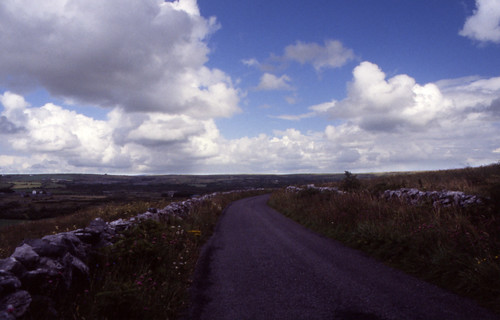Being the second tale in the adventures of three travelers learning the international language of liquor
Ireland is, first, a blur of ancient stone walls flashing out of the night as we blast down back country lanes, fifty kilometers per hour on the black left side of the road. Sarah has only been driving for a month. She and her sister Emma collected us after we touched down at Shannon, we weary and bleary and them bearing broad smiles and accents. They were, immediately, the most fun people I had ever met, but it was now obvious that in this Rover was where we were going to die, grinning, sung off to heaven by broadcast American blues music.
No one dies in Ireland before they’ve had a pint.
First stop, before lodging, before food, before breathing, is the pub. There is no real choice to be made regarding beverage. Oh, our first proper Irish Guinness, ever after supplying credit for haughty complaints about bad pours the world over. While we’re endeavoring to instruct a bartender how to make a white russian the natives reckon our stomachs settled and pack us off to their manse in Quinville, wherein we arrange ourselves around the rough-hewn kitchen table to discuss the seriousness of fairy rings, to eat thick cheddar on dense bread, and to wash down our day with appley hash smoke and a tart can of Irish cider.
We wake to the rain on County Clare, in a giant manor house sprouting from a landscape painting of green down, in which the pipes leak hospitality and there’s more and better food than you’ll find anywhere and the fog in our brains lifts enough to begin the day. We walk wet lanes to the ruin of a fourteenth century Franciscan abbey, climb the walls, perch like gargoyles and wonder idly if the monks here brewed beer. It feels likely.
Our hosts continue the theme of antique architecture by bringing us to a “medieval” banquet at Bunratty Castle; once a stage for war between Ireland and England and Ireland and Ireland, it was now a theme restaurant staffed by actors of lesser stature. Aside from costumes, pewter tableware and pseudo-ribald entertainment the real meaning of a medieval banquet is, naturally, mead. Sticky sweet, imbibed with assurances to our companions that, yes, we can taste the clover. Serious drinking waits a few hours until our first proper night out at a pub. Guinness and cider alternate, each cleansing the palate for the other, and I challenge one of the Brothers Houlihan to a round of billiards for the honor of the United States. We pocket balls to a draw, which satisfies everyone.
An old local drunkard slopped on the bench outside the pub croons slurrily through the highlights of Van Morrison’s back catalogue. I join him by compulsion, and he demands that Emma and Sarah dance for him, for us and for Ireland. They hold hands under the stars and streetlight moon, lazily spinning, reminding us how fairy rings are made.
The next night we’re riding the edge of the Cliffs of Moher, the papery light of the full moon preventing us from accidentally soaring to our demise. If you stick your head over the edge and throw your arms out it feels like you’re flying. This is one of the most amazing places I’ve ever been; cascades of limestone stretch down to the sea crazed and cracked and just begging for you to stand up a shard and feel a little Celtic for a while. Wind screams straight up the cliff face from the sea, threatening to snatch our cans of cider from our hands. Sitting with my feet dangling over the dark limestone, large, fresh chunks of which litter the “beach” below. James finds some largish slabs of rock to throw over the edge. We watch as they fall for nearly thirty seconds before hitting the water. We whoop lustily, wet-throated, at the threat of death. We hatch a plot to spend our last night in-country at something called a “pub”.
“How do you pronounce that?” I asked, pointing to the carved wooden sign hung over the mirror behind the bar. It read FÁILTE in that gaelic-looking typeface which, don’t be fooled, is just as clichéd in Ireland as it is in the U.S.
The question I’d posed was the first thing of any kind I’d actually said to Liz since we’d met a day or so before. It took more courage than anyone reasonable would expect; immediately after the obligatory introductions had been made we’d sat in discrete chairs across the room from one another and pretended not to be staring at each other peripherally. It was some of the loudest non-conversation I’d ever engaged in, but when I finally spoke to her my voice almost broke like an adolescent’s. Almost.
Liz was just the cascade in the stout, as far as my visit to Ireland was concerned. As you’d expect, she was red-haired and had skin like cream. Her trilling lilt of a voice found me just another American sucker for a Colleen, but it was her eyes that did me in. Lightning shards of green-gray-blue stone that knocked me in the forebrain like a camán and I was lost. She turned them on me.
“FOIL-cha,” she said. “It means ‘welcome’.”
A day later we’d be shifting in the back of a crowded, tiny car rocketing through the night while our companions shouted along to a recorded American girl singing Swedish pop, snuggling into each other under a blanket while the hash apple was passed around, sneaking up to my borrowed bedroom shielded by entirely transparent excuses, not sleeping until the sun cracked the horizon. A day later than that and I was carried away by a plane and a train and vanished back into the patchwork of Europe.
